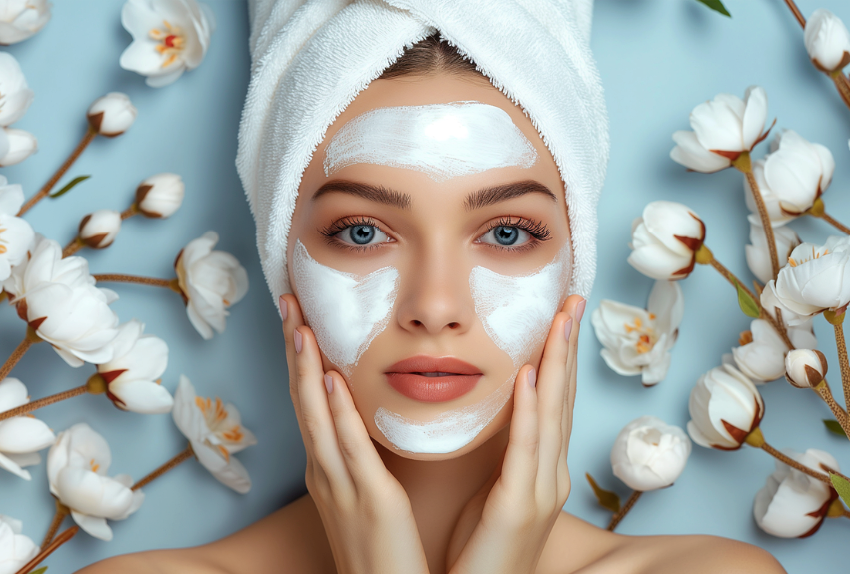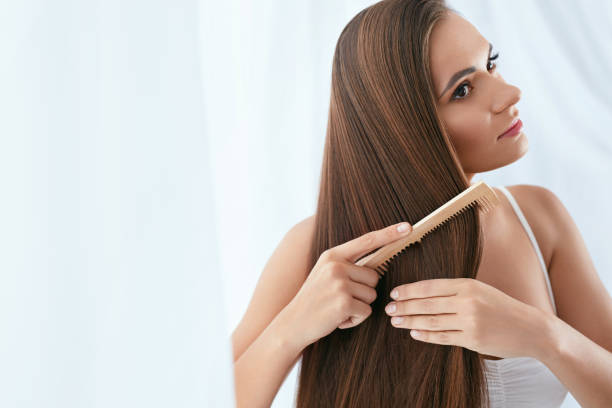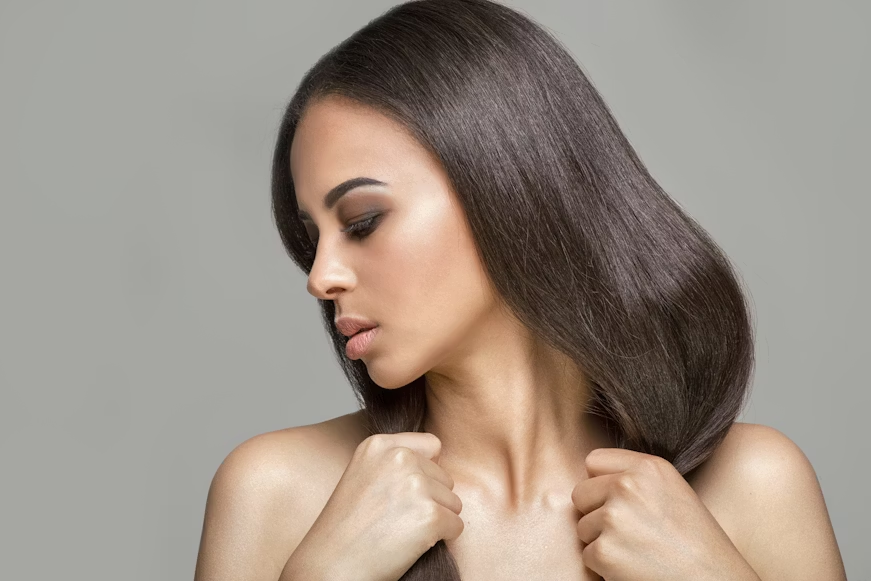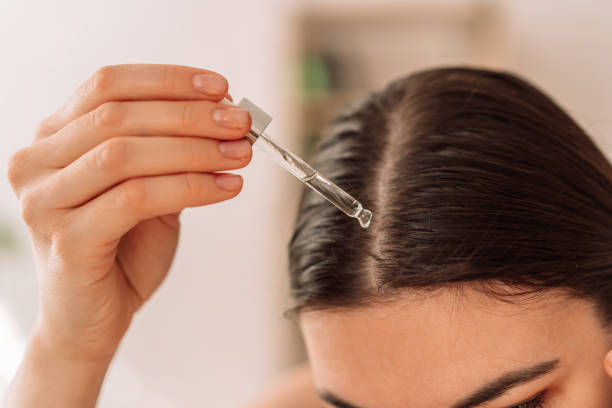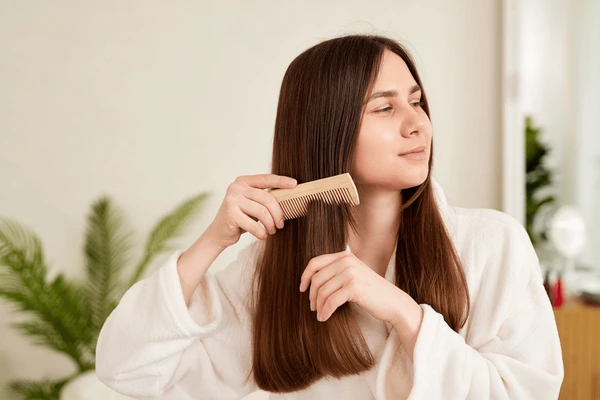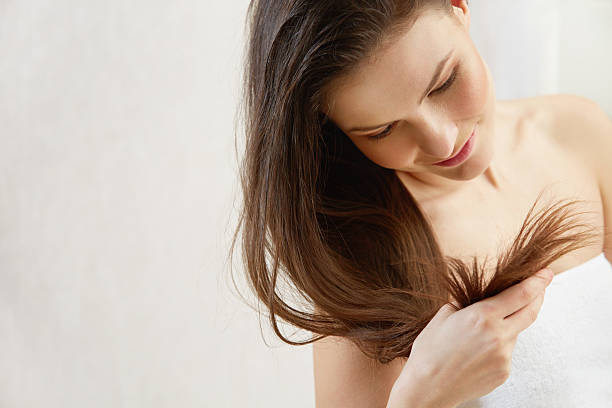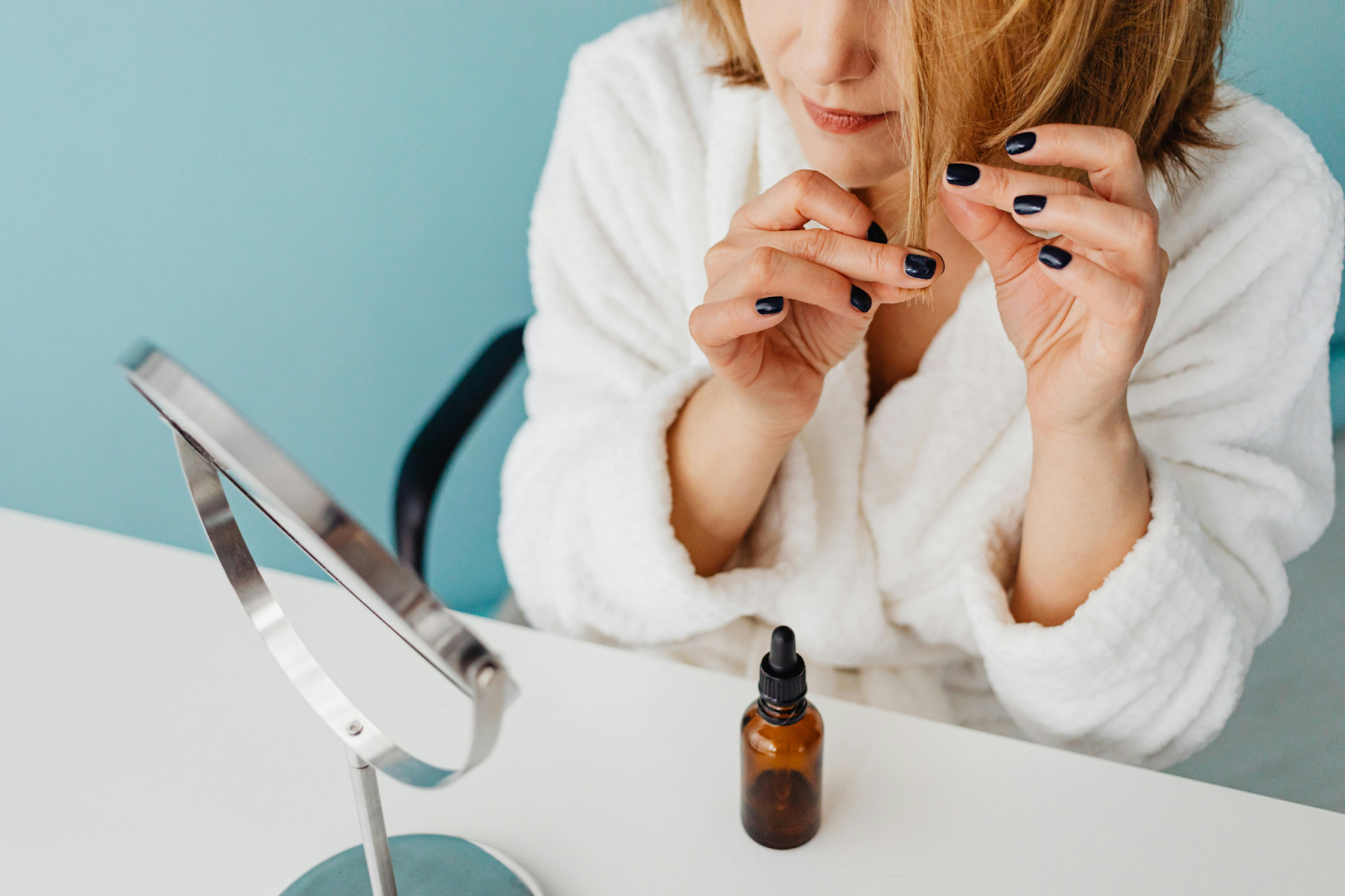Menopause & Greasy Hair: Causes & Tips To Manage Oily Locks
BY TRYBELLO
Jul 30, 2025

Key Takeaways
- Menopausal hormonal shifts cause increased sebum production, leading to greasier hair despite your usual care routine.
- Declining estrogen and rising androgen levels are the primary culprits behind oilier scalp conditions during menopause.
- Simple adjustments to washing frequency, water temperature, and product selection can significantly improve hair appearance.
- Natural remedies like tea tree oil, apple cider vinegar rinses, and specific dietary changes can help rebalance scalp oil production.
- Trybello Hair Helper Spray addresses menopausal hair challenges comprehensively with ingredients like ginger extract to balance scalp conditions, rice ferment filtrate for gentle cleansing properties, and biotin to strengthen hair structure affected by hormonal changes.
Why Your Hair Gets Greasy During Menopause
That sudden shift from manageable locks to seemingly constant oiliness isn't your imagination. Menopause triggers significant hormonal changes that directly impact your scalp's sebaceous glands, which are responsible for oil production. Understanding this connection is your first step toward finding effective solutions.
Hormonal Shifts Impact Oil Production
During menopause, your body experiences a dramatic decline in estrogen levels while other hormones like androgens may remain relatively stable or even increase. This hormonal imbalance disrupts the delicate ecosystem of your scalp. Estrogen typically helps regulate oil production, so when levels drop, that regulatory effect diminishes. This may result in your sebaceous glands going into overdrive, producing excess oil that makes your hair look greasy faster than before.
Androgen Increase Explained
Androgens (male hormones that women also have in smaller amounts) become more dominant during menopause as estrogen levels decline. These androgens can stimulate your sebaceous glands to produce more sebum, the natural oil that, in proper amounts, keeps your hair healthy and protected.
When these hormones shift, many women experience not just oilier hair but also changes in hair thickness and growth patterns. This explains why you might notice both increased oiliness and thinning simultaneously, which can feel particularly unfair!
“Doctor-Approved Natural Spray Rapidly Boosts Growth & Thickness.
Why 100,000+ Women Are Switching to The TryBello All-Natural Solution!"
Join over 100,000 happy customers who’ve transformed their hair with our natural, doctor-formulated spray—rated 4.8/5 by more than 40,000 real users.
Proven Natural Ingredients
- • Caffeine Extract – Naturally blocks DHT and boosts blood flow to hair follicles
- • Biotin – Absorbs directly through the scalp for maximum results—no pills needed
- • Castor Oil – Soothes inflammation and locks in deep, lasting moisture
- • Rice Water Extract – Packed with proteins and minerals to strengthen hair and reduce shedding
Get Visible Results in 12 Weeks
- • Up to 45% increase in hair thickness
- • Reduces shedding and unclogs hair-draining nightmares
- • Supports regrowth in thinning areas
- • Leaves hair soft, shiny, and full of life
Ironclad 120-Day Growth Guarantee
No results after 4 months? Get 100% of your money back—no questions asked.


★★★★★
I started using this twice a day because I noticed my hairline receding. Didn’t pay attention to track results, now my stylist told me my hair has grown a lot since my last root touch up. I'm impressed! - Bailey

Thinning Hair Makes Oiliness More Noticeable

Another challenge during menopause is that many women experience hair thinning due to the same hormonal changes.
Thinner hair shows greasiness more prominently than thicker hair does. When your hair becomes finer or less dense, even a normal amount of scalp oil can make it appear flat and greasy because there's simply less hair to absorb and distribute the oils. This creates a frustrating cycle: the thinning hair looks greasier, and the excess oil weighs down your hair, making it appear even thinner.
This combined effect explains why many women find their hair suddenly difficult to style and quick to look dirty during this life transition. Understanding that this is a normal hormonal response, not a hygiene issue, is important for both your hair care approach and your peace of mind.
Hair Washing Techniques to Reduce Greasiness
Optimal Washing Frequency
Counter to what seems logical, washing too frequently can actually increase oil production. Training your hair to go longer between washes by gradually extending the time between cleansing sessions can help your scalp regulate oil production more effectively.
Start by adding just half a day between washes, then gradually work up to 2–3 days as your scalp adjusts. During this transition period, strategic use of dry shampoo at the roots can help manage appearance while your scalp rebalances.
Water Temperature Matters
Very hot water stimulates oil glands and can leave your hair greasier faster. Switch to lukewarm water for washing and finish with a cool rinse to close the cuticle, adding shine without stimulating oil production.
This temperature adjustment also helps protect color-treated hair, which often becomes more vulnerable during menopause as the hair structure changes.
Scalp Massage Methods
Proper massage techniques during washing help distribute your scalp's natural oils more evenly while improving circulation. This balanced distribution can reduce the appearance of oiliness at the roots while providing much-needed moisture to your ends.
Patience is key when adjusting your washing routine. Your scalp needs time to respond to these changes, but the improvement in hair appearance and manageability is worth the transition period.

For particularly difficult transition days, try styles that work with, rather than against, your hair's current state. Sleek ponytails, braids, and textured updos can look polished even when your hair is on the oilier side.
Diet Changes That Reduce Scalp Oil

What you eat directly influences your hormonal balance and, consequently, your scalp's oil production. Making strategic dietary adjustments can significantly improve your hair's appearance and manageability during menopause.
Foods That Balance Hormones
Incorporating specific foods can help naturally balance hormone levels and reduce excessive oil production. Cruciferous vegetables like broccoli, cauliflower, and kale contain compounds that help your body process estrogen more efficiently, potentially helping with the hormonal imbalance that causes greasy hair.
Antioxidant-rich berries and dark leafy greens support cellular health and combat inflammation that can trigger oil overproduction. Including these foods daily provides your body with the nutrients needed to adjust to changing hormone levels more gracefully. Hydration also plays a crucial role, as adequate water consumption helps flush toxins and supports all bodily functions, including those that regulate oil production.
Supplements That Help
Certain supplements can specifically target hormonal balance and scalp health during menopause. Omega-3 fatty acids help reduce inflammation and support hormone production, while vitamin B complex supports hair growth and helps regulate oil glands.
Zinc supplements may help regulate sebum production, as this mineral is essential for proper oil gland function. Vitamin D also plays a role in hair follicle cycling and can be particularly beneficial for women experiencing both thinning and oiliness. Before starting any supplement regimen, consult with your healthcare provider to ensure it's appropriate for your specific health situation.
Daily Habits for Fresher Hair
Brush Selection and Technique
The type of brush you use and how you use it can dramatically affect oil distribution throughout your hair. Natural bristle brushes, like those made with boar bristles, help distribute oils from your scalp down the hair shaft, preventing buildup at the roots while nourishing drier ends. This redistribution is particularly beneficial during menopause when oil tends to accumulate at the scalp while ends remain dry.
Pillowcase Material Matters
Switching to a silk or satin pillowcase can make a remarkable difference for menopausal hair. These smooth fabrics create less friction than cotton, which means less stimulation of oil glands as you move during sleep. Additionally, silk and satin don't absorb moisture from your hair the way cotton does, helping maintain your hair's natural balance throughout the night while preventing the flattening effect that makes oiliness more noticeable in the morning.
Dry Shampoo: Friend or Foe?
Apply dry shampoo before your hair becomes visibly oily, even the night before you anticipate needing it, for best results. Focus application on the roots and massage thoroughly, then brush through to distribute the product evenly. This preventative approach absorbs oil as it's produced rather than trying to combat already-greasy hair.
However, don't rely exclusively on dry shampoo, as buildup can clog follicles and potentially worsen oil production long-term; always follow up with proper washing within a day or two.
Natural Remedies To Manage Greasy Hair
Apple Cider Vinegar Rinse Recipe
This simple yet effective remedy helps restore your scalp's natural pH balance, which can become disrupted during menopause. Mix one tablespoon of raw, unfiltered apple cider vinegar with one cup of cool water and use it as a final rinse after shampooing. The acetic acid in the vinegar helps remove product buildup while balancing oil production. Don't worry about the vinegar smell; it dissipates as your hair dries, leaving behind naturally shinier, less greasy locks.
Rosemary and Mint Scalp Treatment
This herbal combination works wonders for regulating sebum production while stimulating circulation to the scalp. Steep 2 tablespoons of dried rosemary and 1 tablespoon of dried mint in 2 cups of hot water for 30 minutes, then strain and cool. After shampooing, pour this infusion over your scalp, massage gently, and leave it on for 5 minutes before rinsing. The natural astringent properties help control oil while the tingling sensation indicates increased blood flow to your hair follicles, potentially supporting healthier growth patterns.
Other Natural Solutions
Other natural remedies like aloe vera gel applied directly to your scalp for 15 minutes before shampooing can help normalize oil production. This succulent plant contains enzymes that gently remove excess oil and dead skin cells without disrupting your scalp's natural balance. Natural hair care products like Trybello Hair Helper Spray also provide the moisture your scalp needs without contributing to greasiness, making it an excellent daily treatment for menopausal hair changes.
These natural remedies work best when used consistently as part of your regular hair care routine. Many women find that alternating between these treatments provides comprehensive care for their changing hair needs during menopause.
Trybello's Solution: Mastering Menopausal Hair Balance

Trybello Hair Helper Spray represents a breakthrough approach to menopausal hair management. It’s engineered to address the multi-layered challenges of hormonal hair changes.
Our Trybello Hair Helper Spray combines ginger extract's natural sebum-regulating properties with rice ferment filtrate's gentle cleansing enzymes, creating a balanced scalp environment without the harsh stripping that triggers rebound oil production.
The addition of biotin strengthens hair follicles weakened by hormonal fluctuations, while our water-based delivery system with glycerin provides targeted hydration directly to the scalp without contributing to surface oiliness.
Simply spray two pumps into your hair daily, focusing on areas prone to excess oil, massage gently for 30 seconds to enhance absorption, then style as usual. There’s no complicated routines or messy applications that add stress to your already busy day.
This phase of hair loss is temporary, but the habits you develop now can benefit you for years to come. At Trybello, we're honored to be part of your journey toward balanced, beautiful hair that reflects your inner strength and resilience.
TRY OUR BELLO HAIR HELPER SPRAY NOW →
Frequently Asked Questions (FAQs)
Trending Topics
See our latests posts #TRYBELLO




